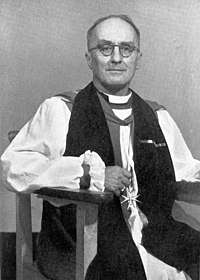Morris Gelsthorpe
(Alfred) Morris Gelsthorpe, DSO, DD (26 February 1892 – 22 August 1968) was an English Anglican priest and missionary. Known popularly as 'Gelly', he was the first Bishop in the Sudan.[1][2]

Early life
He was educated at The King's School, Canterbury and matriculated to Hatfield College, Durham (part of Durham University) as an arts student in October 1911.[3][4] He was part of the same Hatfield cohort as Percy Fewtrell, later to become Dean of Hobart.[4]
In September 1914, not long after the outbreak of the First World War, Gelsthorpe, who had been an active member of the Durham University Officers' Training Corps in his time as a student, enlisted initially as a regular soldier in the Artists Rifles, but then received a commission the following month and transferred to the 8th battalion of the Durham Light Infantry as Second Lieutenant.[5][6]
He served on the Western Front in France, May 1915–September 1916, and April–September 1917; then in Mesopotamia, September 1917–January 1919.[5] He received the Distinguished Service Order on attachment to the Machine Gun Corps and was twice mentioned in despatches.[5] He finished the war with the rank of Lieutenant Colonel, despite his youthfulness.[1] Returning to Durham to read for a licentiate in Theology, he was ordained in 1920 by the new Bishop of Durham Hensley Henson.[7]
Career
Gelsthorpe began his ecclesiastical career with a curacy at St Gabriel’s, Sunderland. In 1923 he became a CMS Missionary and moved to Awka in Colonial Nigeria.[8] A popular minister in Sunderland, before his departure he received the gift of a watch from the committee of Sunderland Rugby Club.[1]
He was Principal of the Staff Training College for African Agents in Awka from 1926 to 1933; Assistant Bishop to the Bishop on the Niger from 1933 to 1938, and Assistant Bishop to the Bishop of Egypt from 1938 to 1945.[9][8] He was Bishop in the Sudan from 1945 to 1952; Rector of Bingham, Nottinghamshire from November 1952 to 1963, and an Assistant Bishop of Southwell from November 1952 'til death.[10][11][12]
Personal
Gelsthorpe claimed to have a 'special interest' in all athletics. He was particularly active in rugby and competed for Blackheath Rugby Club as a youth, later on representing Durham County during his university studies.[5]
In 1949 he married Dr Elfrida Whidborne of the Church Missionary Society Hospital in Omdurman.[13]
Notes
- Gregson, Keith (2011). One Among Many: The Story of Sunderland Rugby Football Club RFC (1873) In Its Historical Context. Andrews.
- ‘GELSTHORPE, (Alfred) Morris’, Who Was Who, A & C Black, an imprint of Bloomsbury Publishing plc, 1920–2007; online edn, Oxford University Press, Dec 2012 ; online edn, Nov 2012 accessed 29 Nov 2013
- "Stand To!" (the journal of the Western Front Association) January 2004, number 69 'Churchman Militant' pp53/4
- "Matriculation Examination". Durham University Calendar 1912-13: 334. 1913. Retrieved 16 December 2019.
- "Gelsthorpe, Rt. Rev. (Alfred) Morris, (26 Feb. 1892–22 Aug. 1968)". Who's Who (UK). Retrieved 16 December 2019.
- "Supplement to the London Gazette, 14 November, 1914" (PDF). London Gazette. Retrieved 16 December 2019.
- Crockford's Clerical Directory 1929-30 p 479 Oxford, OUP 1929
- "The Rt. Rev. M. Gelsthorpe". The Times. 23 August 1968. p. 10.
- Ecclesiastical News: two Assistant Bishops for Africa The Times (London, England), Wednesday, Dec 07, 1932; pg. 17; Issue 46310
- The Journal of African History / Volume 43 / Issue 01 / March 2002 pp 51-75 Copyright © 2002 CUP
- "Preferments and Appointments". Church Times (#4685). 21 November 1952. p. 851. ISSN 0009-658X. Retrieved 25 May 2019 – via UK Press Online archives.
- "Bishop Gelsthorpe: Nigeria & Sudan". Church Times (#5507). 30 August 1968. p. 16. ISSN 0009-658X. Retrieved 25 May 2019 – via UK Press Online archives.
- "Marriage". The Times. 6 January 1949. p. 6.
| Wikimedia Commons has media related to Alfred Morris Gelsthorpe. |